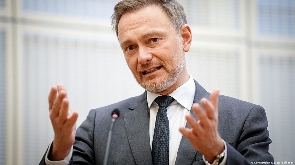 Christian Lindner, German Minister of Finance
Christian Lindner, German Minister of Finance
The current economic crisis facing the country is a wake-up call for retailor investments into sectors with potential to yield maximum and immediate impact, German Minister of Finance, Christian Lindner, has advocated.
Although he lauded efforts at promoting industrialisation, he said the present challenges require strategic direct investments into manufacturing and raw materials – particularly in areas where the country holds competitive advantage on the continent.
The visiting German minister made these remarks in his interaction with students of economics and finance at the University of Ghana, Legon – and added that central to the recovery plan is mobilisation of natural resources to produce high-value products for the export market, while also localising manufacturing by developing new factories and industrial parks.
He went on to explain that situations, where investments in factories become white elephants because of lacking or limited raw material to sustain production after a short while, is wasteful, and does not create much-needed jobs for the youth.
“Ghana is a very strong country with an innovative, powerful and energetic youthful population, and so it is important that we improve on our bilateral relationships. But while we do that, it is absolutely important for sectors of competitive advantage and availability of enough raw materials for sustainability to be considered in the decision-making process.
“You have enough raw and natural resources, but I have doubts that you are making good use of them. I really appreciate government’s efforts to expand human capital and make social mobility easier for a complete society to gain economic well-being, but resources must be channeled to the right places,” Mr. Lindner advocated.
He urged the students to be concerned about matters of national development, and said they should make efforts to contribute in the country’s socio-economic improvement – adding that the voices or opinions of students, especially those at the tertiary level, is critical in decision-making.
Responding to questions from the students regarding external support for the country in the face of current economic distress, he emphasised that, indeed, Ghana might be in need of some sort of support from external creditors to bounce back.
“I think in this situation you need international assistance, but the face of development for this country is in your hands as youth and citizens of this country. External assistance cannot do much without citizens standing up for their country,” he said.
Touching on the reason for his visit, he indicated that the target is to strengthen bilateral relationships between the two countries as part of a broader plan to open the door for more German investments in Ghana.
“There are many economic opportunities on this continent, and I would like to see more German-Ghana bilateral trade initiatives for example,” the minister added.